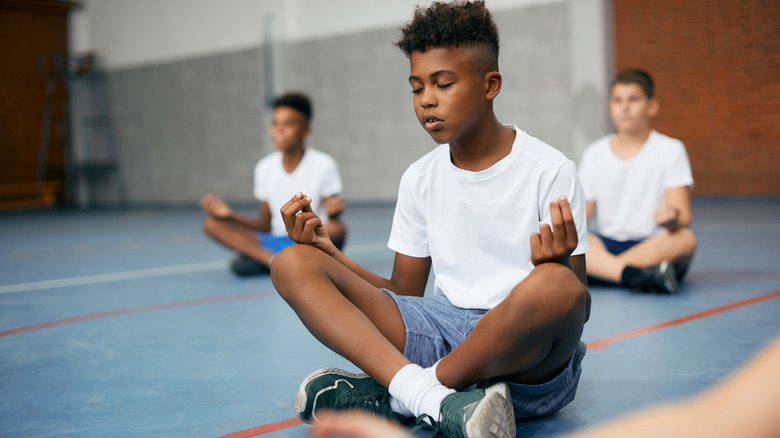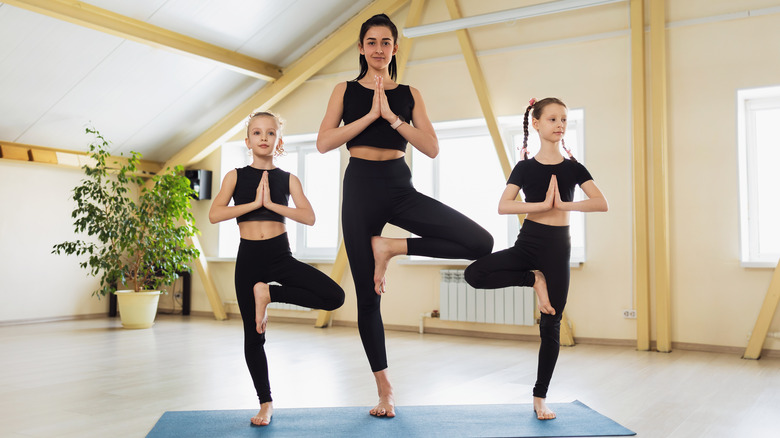Why Alabama Public Schools Banned Yoga
Schools in the U.S. have banned all kinds of things over the years. In 2009, a school in Michigan banned backpacks, saying they posed a security risk when dragged from classroom to classroom (via Mlive). And in 2015, several states (including Florida and New York) banned Silly Bandz rubber-band bracelets from their schools because they were too much of a distraction (per The Week).
Some have gone so far as to ban certain articles of clothing. In 2011, Lake County in Florida decided to ban a number of personal style choices that they deemed extreme and dangerous. Among them, "extreme dyed hair, disruptive make-up, and saggy pants." The reason? School spokespersons cited distraction, blocking direct eye contact, and disrupting attention as reasons to ban styles they deemed "extreme" (via The Daily Mail).
More recent bans have looked at taking away certain practices considered religious as they might offend or influence those who don't follow them. For example, New Jersey's South Orange Maplewood School District (as well as Philadelphia) has banned traditional Christmas carols and any music with religious themes from public schools for years. And despite lawsuits and a long-going legal battle, the ban still stands today (per The Public School Review).
Speaking of religion-related bans, enter yoga. Public schools in Alabama banned yoga from being practiced on school grounds in 1993 for fear it might lead kids to Hinduism (via Diply). The Alabama State Board of Education banned things like hypnosis, meditation, guided imagery, and yoga from all public schools (per AL).
Reasoning for the yoga ban
The Education Board was so serious about the ban that they even included it in the Administrative Code used to regulate education in the entire state (via AL) which they justified by saying teaching spiritual techniques wouldn't be allowed. And since the root of yoga can be traced to Hindu philosophy, its banning is particularly important as it would be considered a potentially religious practice, which would infringe on the mandate of keeping church and state separated, according to AL.
In fact, those in favor of the ban cited concerns about children being exposed to Hinduism through yoga, adding that it would be easy for children to go home, Google yoga, and find information about the religious connection to it. Which in turn could, potentially, lead to some children wanting to be involved in it (via Diply).
The Alabama education system is notorious for banning many physical activities in their public schools. In addition to the practice of yoga, many common children's games -– including kickball, relay races, musical chairs, dodgeball, and tag -– are also "highly recommended and suggested" not to be allowed. They don't serve a purpose, according to the Alabama State Department of Education. They could lead to injury, and they have the potential to embarrass students who aren't as physically capable as others (per AL).
Almost three decades later, in April 2021, a bill was finally introduced to try to lift the yoga ban. The bill was introduced by Representative Jeremy Gray, who himself used yoga during his time as a cornerback in college sports, as reported by CBS News.
Time for a change
Because Gray was very aware of the stern opposition he would face, he proposed a bill with very clear rules as to how yoga could be practiced in schools (per CBS News). This included that yoga would be an elective (so children could opt out if their families objected to it), all yoga poses would need to be referred to using "English descriptive names" and parts of yoga like chanting, mantras, and saying "namaste" would be prohibited.
Gray believed yoga provides both physical and mental benefits, and that children in K-12 schools would greatly benefit from having access to it. In March, the bill passed through the Alabama House of Representatives with flying colors before almost getting stuck with a 4-4 vote in the state's Senate (via AP News). Senator Tom Whatley then voted to end the ban, breaking the tie that would have killed the bill in committee, CBS News reports.
A month later, in May 2021, Alabama Gov. Kay Ivey officially ended the ban by approving the bill with his signature. As originally proposed, kids can now choose to take yoga lessons in school –- as long as their parents sign a permission slip. There will be no "namaste" exchanged between teachers and kids during the practice and meditation (an essential part of yoga) will not be allowed –- something Gray did not particularly like. Still, he decided ending the yoga ban was an important win, even if the final version of the bill wasn't what he originally intended (per NPR). A bit of namaste for everybody involved, no matter by what name.


